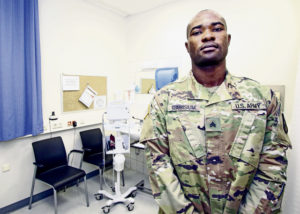
Service in the armed forces is an alternative to college for most American high school students nearing graduation. For James Gabisum, service to the country is a privilege he doesn’t take for granted.
A native of Nigeria, Gabisum’s first experience with the American way of life came after being selected for participation in a foreign exchange student program in the late 2000s. Following selection, Gabisum, only 15 years old at the time, travelled across the world to the U.S. state of Iowa.
“I stayed with a host family in Milford, Iowa, for one year and returned to Nigeria,” explained Gabisum. “After a year, and with the help of the family I stayed with, I returned back to the U.S. to go to college.”
After two years of college education, and becoming a naturalized U.S. citizen, Gabisum felt the need to give back to the U.S. in return for the opportunities afforded to him, so he enlisted in the U.S. Army.
“I wasn’t quite sure what I wanted to do (following school). I was always interested in the military growing up so I felt serving the country would be a good way to kind of like pay back,” said Gabisum, now a sergeant in the Army. “Initially I was just going to do four years but after the four years were up I reenlisted.”
Gabisum, 28, now serves as the noncommissioned officer in charge, Family Medicine Clinic, Landstuhl Regional Medical Center, and says he appreciates the opportunities service in the Army has presented to him, demonstrated by his work ethic and performance as a health care specialist and a Soldier.
“(Gabisum) contributes to the clinic by ensuring all the medics are ready to complete the mission at all times,” said U.S. Air Force Tech Sgt. Jose De Jesus, Gabisum’s supervisor.
As an Air Force supervisor in an Army-commanded Military Treatment Facility, De Jesus explains the value Gabisum has brought to the team and the assistance he has provided De Jesus.
“(Gabisum) assists me with all Army-related tasks and administrative duties and has helped me understand the Army process. Without him my job would have been extremely difficult,” says De Jesus.
Gabisum’s commitment to service was further demonstrated this year as COVID-19 response efforts took effect at LRMC, activating unprecedented operations and introducing restrictions some Soldiers had never experienced before. According to De Jesus, Gabisum continued to lead by example during the pandemic, ensuring Soldiers continued doing what was required of them.
“His calmness can be contagious,” explains De Jesus. “As a leader, he’s continuously engaged with his Soldiers and cares about their careers. He understands that he becomes better by making his Soldiers better with him.”
Recently, Gabisum earned the title of Best Warrior for Regional Health Command Europe, an annual competition which pits Soldiers against each other during multiple warrior tasks, tests and oral assessments. Gabisum credits the opportunities he’s had in the Army for the drive he maintains, both in the clinical setting and on the battlefield.
“I feel it’s important for a Soldier to continue to push themselves further and find opportunities. We all have potential but unless we apply ourselves and try to see how much better we can be, we’re never going to know,” explained Gabisum. “At the end of the day, all these competitions is also training, you learn stuff. You’re not always going to win every competition but it forces you to learn and you become a better Soldier.”


